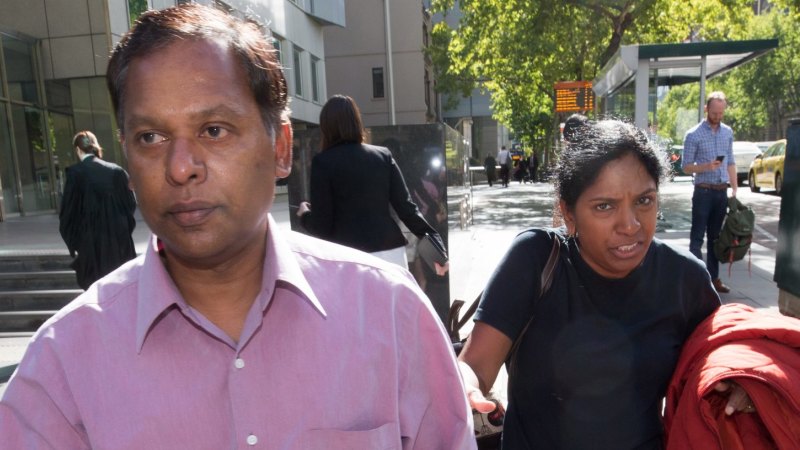Save articles for later
Add articles to your saved list and come back to them any time.
A couple jailed for keeping a slave in their Melbourne home have been ordered to pay their victim more than $485,000 for years of “unpaid wages” in the first payment of its kind in Australia.
The victim, now aged in her 70s and who cannot be named, has been living in an aged care home after being hospitalised in 2015 with sepsis and hypothermia.
Kandasamy (left) and Kumuthini Kannan outside a court in 2017.Credit: Jason South
Kumuthini Kannan and husband Kandasamy Kannan were jailed in 2021 for eight and six years, respectively, after being found guilty of intentionally possessing and using a woman as a slave at their Mount Waverley home from 2007 to 2015.
The victim’s lawyer, David Hillard, said federal Attorney-General Mark Dreyfus recently granted the payment as a result of the Kannan family’s assets being seized by the Australian Federal Police during their criminal investigations.
It was the first time the government had intervened for a victim of slavery to receive compensation, Dreyfus said.
Hillard said the payment meant the woman could now afford to return to her family in India after 16 years.
“Slavery did not end in the 19th century. This is happening right now, in our community, under our noses,” Hillard said.
“[The woman’s] case shows that there are avenues under Australian law to obtain justice for victims of labour trafficking and slavery.
“We think it is the largest amount ever recovered by a victim of slavery in Australia.”
During the 10-week trial in 2021, the Supreme Court heard that the woman, originally from southern India, arrived in Australia in 2007 to work with the Kannans and intended to send money back to her own family.
But soon after she arrived, the Kannans took her passport and, the court heard, the woman was forced to work up to 23 hours a day, cooking and cleaning for the couple and their children.
The trial heard the woman had limited education and did not speak English.
Paramedics found the woman in 2015 in a pool of her own urine in the bathroom of the home, gravely unwell and weighing just 40 kilograms.
She later told the court that throughout the years of abuse, she was hit with a frozen chicken, had hot tea thrown on her and was pushed down stairs.
Prosecutors successfully argued the Kannans kept the woman as a slave by controlling every aspect of her life. This, they said, included denying her healthcare and proper payment, as she was paid about $3.39 a day.
In July, Kumuthini Kannan was sentenced to further jail time after police found she had posed as a Tamil interpreter and used a shopping centre payphone to call the woman on the eve of the criminal trial.
During the phone call, the court heard she told her victim: “Don’t repeat what you are saying. If you do, you will lose everything.”
For that crime, she was jailed for a further 2½ years after later pleading guilty to attempting to pervert the course of justice, but a judge but ordered that most of that sentence run concurrently with her jail term on the slavery charges.
Kumuthini Kannan outside the Supreme Court in 2021, during her trial on slavery charges.Credit: Chris Hopkins
The compensation paid to the woman is the first time a direction of its kind has ever been used under the Proceeds of Crime Act 2002. The act permits the attorney-general to make directions that include payments to victims of serious offences.
Dreyfus said he was delighted the government had ensured the woman was compensated for the appalling abuse she suffered.
“We wish her all the best for a happier future, reunited with her family,” Dreyfus said.
“Modern slavery has no place in our society.”
Australian Federal Police human trafficking team: 131AFP (131237).
The Morning Edition newsletter is our guide to the day’s most important and interesting stories, analysis and insights. Sign up here.
Most Viewed in National
From our partners
Source: Read Full Article


